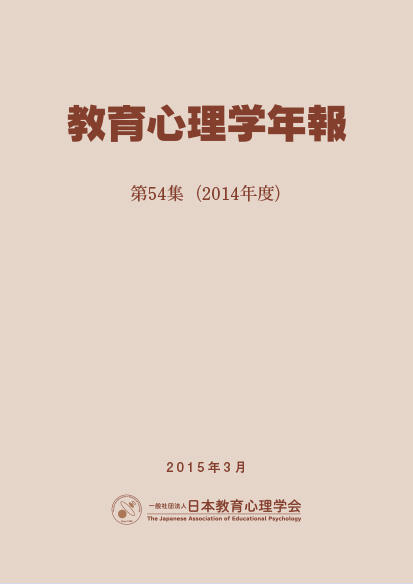Volume 54
Displaying 1-29 of 29 articles from this issue
- |<
- <
- 1
- >
- >|
-
2015Volume 54 Pages Pref00_1
Published: June 30, 2015
Released on J-STAGE: August 25, 2015
Download PDF (125K)
I Reviews of Research Trends in Educational Psychology in Japan During the Past Year Development :
-
2015Volume 54 Pages 1-15
Published: June 30, 2015
Released on J-STAGE: August 25, 2015
Download PDF (590K) -
2015Volume 54 Pages 16-29
Published: June 30, 2015
Released on J-STAGE: August 25, 2015
Download PDF (601K) -
2015Volume 54 Pages 30-44
Published: June 30, 2015
Released on J-STAGE: August 25, 2015
Download PDF (610K) -
2015Volume 54 Pages 45-56
Published: June 30, 2015
Released on J-STAGE: August 25, 2015
Download PDF (578K) -
2015Volume 54 Pages 57-70
Published: June 30, 2015
Released on J-STAGE: August 25, 2015
Download PDF (572K) -
2015Volume 54 Pages 71-83
Published: 2015
Released on J-STAGE: August 25, 2015
Download PDF (568K) -
2015Volume 54 Pages 84-101
Published: 2015
Released on J-STAGE: August 25, 2015
Download PDF (772K) -
2015Volume 54 Pages 102-111
Published: 2015
Released on J-STAGE: August 25, 2015
Download PDF (518K) -
2015Volume 54 Pages 112-125
Published: 2015
Released on J-STAGE: August 25, 2015
Download PDF (608K)
II Educational Psychology and Practical Activities
-
2015Volume 54 Pages 126-141
Published: 2015
Released on J-STAGE: August 25, 2015
Download PDF (1228K)
III The 56th Meeting of the Japanese Association of Educational Psychology
-
2015Volume 54 Pages 142-144
Published: 2015
Released on J-STAGE: August 25, 2015
Download PDF (289K)
Keynote Speech Planned by the Organizing Committee
-
2015Volume 54 Pages 145-152
Published: 2015
Released on J-STAGE: August 25, 2015
Download PDF (619K) -
2015Volume 54 Pages 153-160
Published: 2015
Released on J-STAGE: August 25, 2015
Download PDF (483K)
Symposia Planned by the Organizing Committee
-
2015Volume 54 Pages 161-164
Published: June 30, 2015
Released on J-STAGE: August 25, 2015
Download PDF (324K) -
2015Volume 54 Pages 165-172
Published: 2015
Released on J-STAGE: August 25, 2015
Download PDF (444K) -
2015Volume 54 Pages 173-180
Published: 2015
Released on J-STAGE: August 25, 2015
Download PDF (535K) -
2015Volume 54 Pages 181-186
Published: 2015
Released on J-STAGE: August 25, 2015
Download PDF (408K)
Tutorial Seminar Planned by the Organizing Committee
-
2015Volume 54 Pages 187-190
Published: June 30, 2015
Released on J-STAGE: August 25, 2015
Download PDF (671K)
Panel Discussion Planned by the Organizing Committee
-
2015Volume 54 Pages 191-193
Published: June 30, 2015
Released on J-STAGE: August 25, 2015
Download PDF (258K)
Symposia Planned by the Research Committee
-
2015Volume 54 Pages 194-201
Published: June 30, 2015
Released on J-STAGE: August 25, 2015
Download PDF (420K) -
2015Volume 54 Pages 202-211
Published: June 30, 2015
Released on J-STAGE: August 25, 2015
Download PDF (543K) -
2015Volume 54 Pages 212-220
Published: June 30, 2015
Released on J-STAGE: August 25, 2015
Download PDF (440K)
Tutorial Seminar Planned by the Research Committee
-
2015Volume 54 Pages 221-226
Published: June 30, 2015
Released on J-STAGE: August 25, 2015
Download PDF (390K) -
2015Volume 54 Pages 227-235
Published: June 30, 2015
Released on J-STAGE: August 25, 2015
Download PDF (488K)
IV Special Lecture for Preventing Harassments
-
2015Volume 54 Pages 236-258
Published: June 30, 2015
Released on J-STAGE: August 25, 2015
Download PDF (1851K)
V Open Symposium Planned by the Japanese Association of Educational Psychology
-
2015Volume 54 Pages 259-265
Published: June 30, 2015
Released on J-STAGE: August 25, 2015
Download PDF (542K)
VI Kido Award : Selection Process and Comment & Recipients’ Comments
-
2015Volume 54 Pages 266-271
Published: June 30, 2015
Released on J-STAGE: August 25, 2015
Download PDF (388K)
VII Outstanding Paper Award : Selection Process and Comment & Recipients’ Comments
-
2015Volume 54 Pages 272-276
Published: June 30, 2015
Released on J-STAGE: August 25, 2015
Download PDF (351K)
- |<
- <
- 1
- >
- >|
